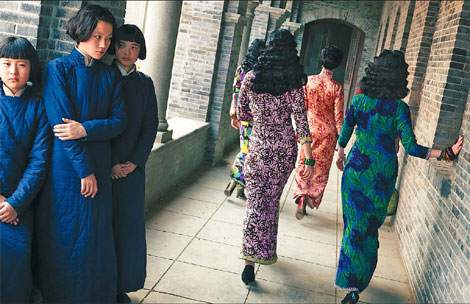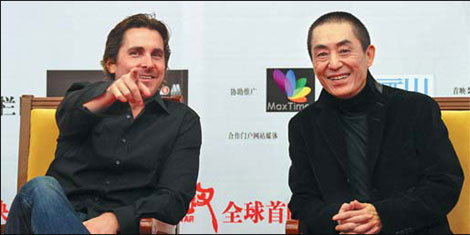A bit too bright for its own good
Updated: 2011-12-16 07:35
By Raymond Zhou (China Daily)
|
|||||||||
|
A scene from Zhang Yimou's new film The Flowers of War. Provided to China Daily |
A new film about one of the most heartrending episodes in recent Chinese history leaves more to be desired.
The Flowers of War is not the first Chinese movie to tackle the painful subject matter of the Nanjing Massacre, and it won't be the last.
For many Chinese writers and artists, the tragedy that took place 74 years ago is the litmus test for their art and consciences.
Coincidentally, Chinese-American writer Ha Jin came out with his rendition of the events in the dark December days of 1937.
Like Ha Jin's novel, Nanjing Requiem, Zhang Yimou's new film is based on a few details in Wilhelmina "Minnie" Vautrin's diary.
 |
Vautrin was an American missionary, who saved the lives of many Chinese women at Ginling Girls College in Nanjing, then spelled "Nanking" and the capital city of China. An entry in her diary mentioned a group of prostitutes took the place of female students in attending a "party" thrown by the occupying Japanese soldiers.
Anyone with a modicum of dramatic sense would see the potential in this fact for a full-blown dramatization.
As a matter of fact, a film of a similar story was made in 1988. Sanctuary was co-directed by none other than Han Sanping, currently the boss of China Film Group and, by extension, the reigning godfather of Chinese cinema.
Zhang Yimou's version, which opens nationwide today, is naturally bigger and more lavish.
It features Oscar winner Christian Bale in the lead. Bale plays an American mortician, whose talent for touching up dead bodies found an unexpected use later in the film.
John Miller is a fictional character, nothing like the Westerners who were heroes in the massacre, also known as the "Rape of Nanking" in the West. He is almost a caricature of typical movie roles assigned to opportunistic Americans - greedy and licentious in a playful way.
Obviously designed for the Western market, the role of an American "jerk", so-called by the church boy who sought his help, is to provide an angle into the chain of events that is accessible for a worldwide audience.
However, that poses a big challenge when Miller turns into a reluctant hero - a maneuver that is bravely handled by Bale with his star power but is still less than convincing.
Likewise, the band of courtesans is treated with broad strokes that leave little room for nuance.
They descend on the Winchester Cathedral in their full florid garb and selfish frivolity - as if they were totally oblivious to the rampages of war engulfing them.
Even Yu Mo, the most intelligent of the bunch, displays a haughtiness that beauty alone would not endow in the circumstances as much as a self-delusion about the harrowing nature of war.
The cast is divided into four major camps: the Chinese soldiers, the Japanese soldiers, the courtesans and the schoolgirls.
Except for one or two "representatives" from each group, the minor characters are rarely given unique portrayals, so they blur into the background like wallflowers. This seems to be consistent with the melodramatic style employed by the filmmaker: Everything is heightened - not for authenticity but for a better yarn.
Although all Chinese troops die in the film, the accuracy and the scale of damage they are able to inflict on the invading Japanese is so amazing that it can only happen in a feel-good adventure flick.
That takes away much of the pathos almost innately built in the story.
One is constantly waiting for a superhero to vanquish all the bad guys and reverse the historical chapter that lingers so achingly in the Chinese national psyche.
Zhang Yimou simply cannot contain his flourish for sprightly colors.
In the scene where the last Chinese soldier dies in an explosion, the store across the street from the cathedral where he has been in hiding happens to be one that sold colored paper.
That provides an excuse for a firecracker-like effect for the final blowup, which looks splendid on screen but reminds me of the Beijing Olympics rather than wartime horrors.
| ||||
Their confrontation is brief, and Tong shows much restraint in entrusting a very youthful fellow soldier to the courtesans.
The soldiers' sacrifice is directly linked to the fate of the schoolgirls, yet receives just the right amount of screen emphasis.
On the other hand, the courtesans' sacrifice, just like their initial selfishness, is played up to a tee so that it borders on melodramatic overkill. There is a lot of contrast for the sake of contrast, with the humanity of the courtesans glinting from only a few scenes.
Not all flourishes are over the top, though. The dream sequence where they sing their brothel song in a showgirl-style lineup is unexpectedly powerful as an emotional climax.
The glamorous role of Yu Mo, played by newcomer Ni Ni, has received the strange combination of underexposure and over-hype - that is, by keeping her public appearances to the minimum yet leaking praise of her so-called breakthrough performance.
While it is an auspicious debut, it hardly measures up to what Tang Wei achieved in Lust, Caution, which is what the publicity machine has been touting.
Glamour conceals the lack of depth here.
If a scene requires only one emotion, she is quite competent. Also, crisp as her reading of English lines is, she seems foreign to the art of the pause.
Speaking of foreign language, the film has at least half of the dialogues in English. The use of modern terms like "whatever" as an American teenage colloquialism or "makeover" in the subtitles can be distracting to discerning native speakers.
Don't get me wrong. My nitpicking does not push me to the conclusion that The Flowers of War is not a good film.
It is quite good and worth a trip to your local movie theater.
It just fails to attain the greatness this filmmaker and this subject deserve. It is not a masterpiece, such as on a par with Schindler's List by Steven Spielberg or The Pianist by Roman Polanski.
For my taste, it is not as agonizing or soul-searching as Lu Chuan's City of Life and Death - even though both share quite a few character types like the whore with a heart of gold and the unwilling collaborator.
For a subject of such emotional intensity, The Flowers of War is strangely deficient in emotional impact. It was more calculated than inspired.
Many of the above-mentioned flaws could have been forgivable if the movie had more spontaneity and did not flirt with bathos.
However, melodrama is popular with a wide swathe of the populace, people who are cushioned by a daily dose of television series and, therefore, may well embrace such treatment.
Overall, Zhang Yimou's master craftsmanship is on full display here.
The story is tightly knit, and 141 minutes do not feel long at all. What everyone can expect is the visual splendor that Zhang serves so abundantly in almost every one of his oeuvres.
|
Christian Bale and Zhang Yimou. Jiang Dong / China Daily |
Whether this adds to the gritty portrayal of the brutality of war or curtails the power of narration is another matter.
However, there are places Zhang's virtuosity is tampered by some clumsy strokes.
A team of Chinese soldiers is depicted as falling one by one so that the last one can get close enough to the enemy tank to blow it up. This amazing act of ultimate heroism is preceded by a voiceover explaining why they choose to do so - an intrusive voiceover rather than a natural dialogue among soldiers for exposition. Is it the result of underestimating audience intelligence or over-reliance on a bag of old tricks?
In the end, one has to ask: Does this movie shed new light on humanity and make you a better person? I'm sure many people will say yes.
Unfortunately I'm not one of them. I think Zhang Yimou could have done better.














